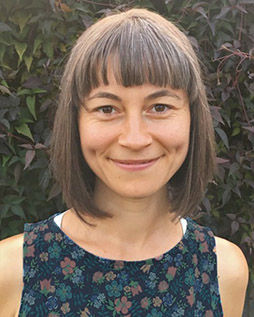
Liliana Bounegru is a new media, digital methods and digital journalism researcher and a postdoctoral research fellow at the University of Oxford. She is affiliated with the Oxford Internet Institute and the Reuters Institute for the Study of Journalism. She is part of Misinformation, Science and Media, an Oxford Martin School programme that investigates the impact of misinformation campaigns online on the public understanding of technoscientific issues. She is also a researcher at the Digital Methods Initiative (University of Amsterdam), where she previously acted as a Managing Director. She is also a co-founder of the Public Data Lab, and a research associate at the Sciences Po Paris media lab. Her research interests include digital media, digital culture, digital journalism, inventive methods for new media research, digital methods, infrastructure studies, platform studies, issue mapping and controversy mapping.
DJRG Fellow, June 2019
Her work has been published in New Media & Society, Big Data & Society, Visual Communication and Digital Journalism. She is co-editor of The Data Journalism Handbook (O’Reilly Media, 2012; University of Amsterdam Press, 2019), translated into dozens of languages, and co-investigator of A Field Guide to Fake News and Other Information Disorders, a multi-institutional research collaboration to trace the circulation of political misinformation, junk news and memes online (also available in Japanese).
Title and abstract
The Infrastructural Uncanny and the Social Life of Junk News Online
The 2016 US presidential election has brought social media and associated phenomena such as Internet memes, “fake news” and online disinformation under intense media and academic scrutiny. Concerns have been raised about the rapid distribution of this
problematic content on social media and many technological, media literacy and factchecking solutions have been proposed to curb these worrying dynamics. This talk draws on insights, concepts and approaches from science and technology studies and Internet studies to examine current debates and research around misinformation and “fake news” and challenge some of the assumptions behind them. It argues that “fake news” is not just problematic content whose rapid spread needs to be curbed, but that this phenomenon encapsulates central aspects of our digital environments and thus it provides a good opportunity to study their dynamics. More specifically, it proposes to explore the publics, modes of circulation and tracking networks in which junk news is embedded as an opportunity to reflect on how digital platforms and the dynamics that they engender participate in the production of public (mis)information. This talk draws on Research conducted across several projects with several institutions over the past couple of years, including:
- A Field Guide to “Fake News” and Other Information Disorders (Public Data Lab): a transnational, multi-institutional research project to understand the role of online misinformation, junk news, memes and trolling practices in past years’ elections in the US and several European countries.
- Misinformation, Science and Media Programme (Oxford Internet Institute, University of Oxford): a research project that examines the interplays between social media, news and misinformation campaigns, and their implications for the public understanding of scientific and technological issues, with a particular focus on climate change and artificial intelligence.
- Beyond Verification: Authentication, Authenticity and the Spread of Fake News (Digital Democracies Group, Simon Fraser University): a multi-institutional research project that aims to generate new knowledge about why and how fake news spreads. By studying the structures that foster fake news, the actions on- and off-line that shape user identity and generate trust, the algorithmic scripts that authenticate and segregate users, and the advertising models that foster outrage, it builds a multi-disciplinary and multi-modal approach to understand the impacts of emerging technologies on society, politics, culture and identity.
- A Digital Test of Public Facts (Centre of Interdisciplinary Methodologies, University of Warwick): the project investigates the changing nature of public knowledge formation in digital societies and develops inventive methods to capture and visualise knowledge dynamics online.
Selected publications
- Gray, J., Bounegru, L., & Venturini, T. (2019). ‘Fake News’ as Infrastructural Uncanny. New Media & Society. In press.
- Bounegru, L., Gray, J., Venturini, T. & Mauri, M. (Co-investigators). (2018). A Field Guide to “Fake News” and Other Information Disorders. Amsterdam: Public Data Lab.
- Venturini, T., Bounegru, L., Gray, J., & Rogers, R. (2018). A Reality Check(List) for Digital Methods. New Media & Society, 1–23.
- Bounegru, L., Venturini, T., Gray, J., & Jacomy, M. (2017). Narrating Networks: Exploring the Affordances of Networks as Storytelling Devices in Journalism. Digital Journalism, 5(6), 699–730. https://doi.org/10.1080/21670811.2016.1186497